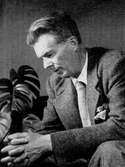Aldous Huxley Quote
„Hitler´s dictatorship, he said, „differed in one fundamental point from all its predecessors in history. It was the first dictatorship in the present period of modern technical developement, a dicttorship which made complete use of all technical means for the domination of its own country. Through technical devices like the radio and the loud-speaker, eighty million people were deprived of independent thought. It was thereby possible to subject them to the will of one man....Earlier dictators needed highly qualified assistants even at the lowest level – men who could think and act independently. The totalirian system in the period of modern technical development can dispense with such men; thanks to modern methods of communication, i tis possible to mechanize the lower leadership. As a result of this there has arisen the new type of uncritical recipient of orders. (Albert Speer)
„Hitler´s dictatorship, he said, „differed in one fundamental point from all its predecessors in history. It was the first dictatorship in the present period of modern technical developement, a dicttorship which made complete use of all technical means for the domination of its own country. Through technical devices like the radio and the loud-speaker, eighty million people were deprived of independent thought. It was thereby possible to subject them to the will of one man....Earlier dictators needed highly qualified assistants even at the lowest level – men who could think and act independently. The totalirian system in the period of modern technical development can dispense with such men; thanks to modern methods of communication, i tis possible to mechanize the lower leadership. As a result of this there has arisen the new type of uncritical recipient of orders. (Albert Speer)
Related Quotes
About Aldous Huxley
Born into the prominent Huxley family, he graduated from Balliol College, Oxford, with an undergraduate degree in English literature. Early in his career, he published short stories and poetry and edited the literary magazine Oxford Poetry, before going on to publish travel writing, satire, and screenplays. He spent the latter part of his life in the United States, living in Los Angeles from 1937 until his death. By the end of his life, Huxley was widely acknowledged as one of the foremost intellectuals of his time. He was nominated for the Nobel Prize in Literature nine times, and was elected Companion of Literature by the Royal Society of Literature in 1962.
Huxley was a pacifist. He grew interested in philosophical mysticism, as well as universalism, addressing these subjects in his works such as The Perennial Philosophy (1945), which illustrates commonalities between Western and Eastern mysticism, and The Doors of Perception (1954), which interprets his own psychedelic experience with mescaline. In his most famous novel Brave New World (1932) and his final novel Island (1962), he presented his visions of dystopia and utopia, respectively.
